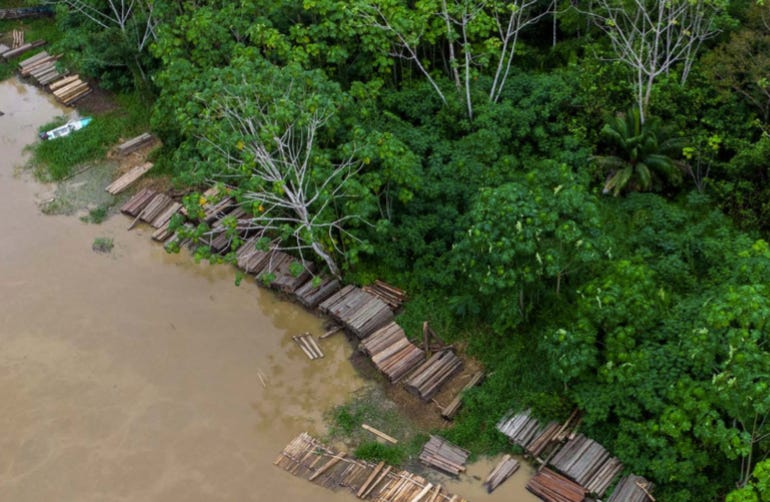How US and EU firms are complicit in the illegal logging of Colombia’s rainforests
New report by US NGO links timber trade to debt slavery and armed conflict
Another month, another report from the US-based NGO Environmental Investigation Agency (EIA) about illegally-logged tropical hardwood making its way from some remote part of South America to the US and the EU. In April the focus was Brazil. Now it’s Colombia. The headline conclusion: that the vast majority of Colombian decking and flooring timber exports between 2020 and 2023 “lacked a legally required certificate issued by authorities to validate their lawful origin”, thereby making it impossible for importers to know if the timber was legal or not.
While initially the vast majority of that timber went to Mexico, about 20% was exported directly to the US, EU and Canada - “each with laws obliging importers ensure the legal origin of their products”, according to EIA. The big question therefore is: how can those American, European and Canadian importers really be sure the timber they’re buying is legal if it doesn’t have the required certificate?
Titled Decking the Forest, EIA’s latest report includes numerous other allegations too. Most importantly: that this trade in illegal timber involves the exploitation and debt enslavement of Afro-descendant, indigenous and/or other rural communities, the “laundering” of timber to make it appear legal, and the payment of “taxes” to “illegal armed groups” (IAGs) who have assumed control of parts of the country.
In other words, buying some of that timber - whether you’re an importing company, retail outlet or consumer wanting, say, new decking to sit on at home - means indirectly financing some of Colombia’s most violent paramilitaries and fuelling an armed conflict that, over decades, has killed hundreds of thousands of people and displaced millions.
On various occasions, in the heavily rainforested Chocó region in far west Colombia, EIA researchers themselves came into contact with IAGs. “The investigation found that to access these areas, outsiders need approval from armed groups and are monitored continuously by them to ensure their interests are not threatened. On three separate occasions EIA was detained by armed groups seeking to verify who they were, before allowing them continued access, highlighting the dangers of traveling for the community members. Meetings between outsiders and local communities are always attended by at least one member of an IAG.”
The heart of the report is three case studies. The first alleges that 93% of a Colombian company’s US, EU and Canada exports - some of which was cumaru, a highly-prized and vulnerable species - didn’t have the required certificate certifying legal origin. Not only that, but one of the firm’s owners revealed they have “longstanding relationships with IAGs in Colombia’s Pacific region, corruptly paying them to enable its forestry business to operate.”
The second case study: an exposé of another Colombian firm - also handling lots of cumaru - failing to obtain both export certificates and transport permits. In addition, that company has apparently sourced timber from harvest areas where clear-cutting rather than selective logging has been done, and from “local community forests riddled with social conflict linked to IAGs.”
The third: another Colombian firm - this one based in the Amazon - exporting primarily to the US without the required certificates. Evidence also suggests that some of their harvest areas have been used for laundering, and that reports of inspections by a regional government authority have been falsified.
Some of this - the lack of the correct paperwork, laundering, falsified inspections, exploitation of communities, popularity of cumaru and debt slavery - sound reminiscent of neighbouring Peru, where for decades the tropical timber sector has been rife with illegalities and corruption, and where EIA, among international NGOs, has taken the lead in exposing how things work too. But in some ways what their researchers found in Colombia was far worse.
“Colombia’s timber industry is smaller than that of Brazil or Peru, yet in some ways the situation is more severe,” says EIA’s Susanne Breitkopf. “Much of the timber harvested in the Pacific and Amazon regions comes from areas under the control or influence of armed groups, which means violence and coercion are more acute. This is further complicated by the fact that many Afro-Colombian and Indigenous communities live in those same territories.”
Breitkopf also points out that “governance is particularly weak”, given that “the state has little or no effective presence in these zones - in contrast to Brazil and Peru.”
“Most strikingly,” she says, “Colombia lacks a national oversight body that independently verifies whether logging is conducted legally. Brazil has IBAMA, and Peru has OSINFOR, but Colombia has no equivalent.”
In the immediate short-term things could get even worse because, just 10 days after Decking the Forest was published, a new law came into force that eliminated the need to have the export certificates that the report focuses on, thereby making traceability even harder.
“We do see this as a weakening,” Breitkopf continues. “The new law removes the need for the certificate and eliminates traceability from the last processing unit to the port, requesting that exporters merely issue what is called a “remision” - a transport permit. But the format of this document has no link to a previous transport permit, which means it will not be possible to know the legal origin of those exports via that document.”
Unsurprisingly, Decking the Forest concludes with numerous recommendations for Colombia’s government, but some also for the US and EU too. These include that US and EU law enforcement “ensure all US and EU importers are exercising due care or due diligence on their Colombian timber imports respectively, and that all imported products have valid certificates and are legal and conflict free.” Now that this report has been published those importers can’t claim they haven’t been warned.



